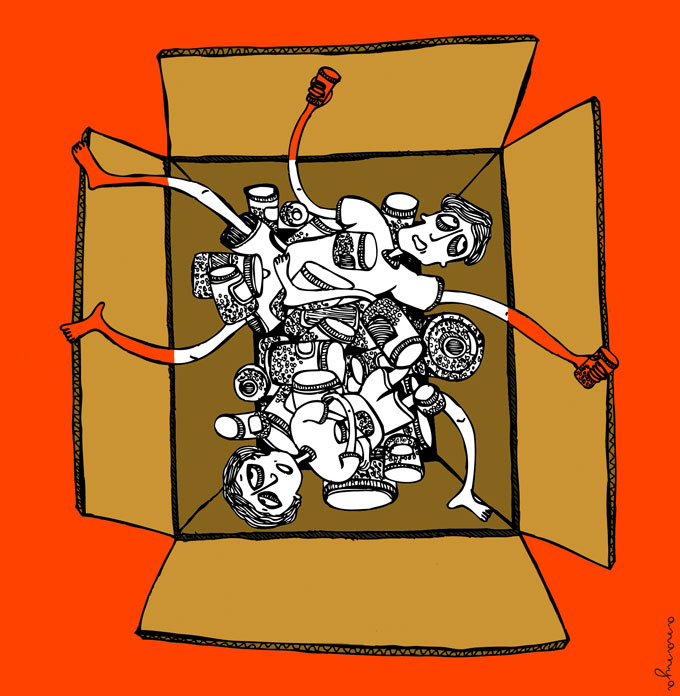411

When Bhindi was arrested, we decided it was the final straw. He had been picked up by a police superintendent while rifling for 411 on his laptop in a neighbourhood café. Apparently, they were pressing charges for theft. Bhindi had been one of us, helping us get to the stuff on which we used to binge together. His loss hit hard.
There was a fairly impressive piece in the newspaper the next day: ‘Local youth arrested for stealing assets worth Rs. 30 crores’. A mug shot of a red-eyed Bhindi looking slightly bored accompanied it. The public was thus informed of the seemingly harmless looking young man who had singlehandedly been running a racket to thieve the property of good, honest, and hard-working writers, artists and musicians. He had then been smuggling the goods into a rapidly growing underground market of an illegal but much sought-after psychotropic substance called isoinformo heptaeolas—popular among junkies as 411. The news clip then ranted about the degrading values of the young generation, who feel pride in living a life of decadence and meaninglessness, while infecting the social fabric with their immoral conduct and pilfering the national income. It was quite moving.
“Know what? I had no clue we smoked up 30 crores,” I remarked.
“Uh huh, me neither,” Tippi muttered as he polished his guitar. He was concentrating hard at it.
We observed a moment of silence to mark respect for our lost comrade. It had been a good run with him. The sky was very blue outside. Mid-August, and a dry spell in the middle of monsoon.
“What now?” I asked.
“We’ll need more of it. Let’s go,” Tippi said, getting up.
We walked outside into the sunshine. It pricked our eyes so I looked up fiercely at the sun. Then we closed our eyes and crossed the street, took a right turn, bumped into some parked vehicle, changed our direction and kept moving. Komil had taught us this trick. If we closed our eyes and just kept moving, we could reach wherever we wanted if we didn’t know where the place was. Or what place it was. It always worked for us. A pretty neat trick, I would say. We hadn’t heard from her since she had gone out to meet a new friend a couple of nights ago. She didn’t know where he lived, so she had probably used this trick.
At the time, I had been living with Tippi, Komil, and Bhindi. I had no money and used to write occasionally on paper, on the Internet and on walls. Tippi and Bhindi would play their guitars. Komil was a ballet dancer. We were starving in our ragtag clothes, writing beautiful songs and trashy poetry. But happily enough in order to survive, we needed only one thing: 411. And to know that we had transcended the so-called essential need for food gave us a certain kind of power. Even made us feel like God, with the entire world spinning around us.
I reckon we were addicts and 411 was our drug. That would have been plain and simple. Except I did not like plain and simple and I did not like to think of ourselves as addicts. Addict is such an accusatory word. And unlike an addiction, 411 was not a mere craving, it was indispensable. Even if everything else was taken away, 411 was enough. 411 was freedom, and the thought of living in a world where we could not use it was not just frightening but unbearable, even to the point of disgusting.
So we were hunting more 411 now.
When we opened our eyes, we were at a tall building which read: Ministry of Information and Broadcast.
“This is the Ministry of Information and Broadcast.”
“Looks like so.”
“Why are we here?”
“I don’t know. Let’s go in and see.”
We entered the building. It was kind of dingy inside, but we kept walking.
“What do you want?,” a rough voice asked behind us. We turned to see a man dressed in khakis.
I was groping for an answer when Tippi broke in excitedly.
“No, I know! We are important people!”
“Oh yeah?” The man regarded our clothes with some contempt.
“Yeah,” Tippi said. “Yeah, very important people.” I could see he was gaining more confidence with every sentence that he spoke now. “We are very V.I.P., and we need to see other V.I.P. people.”
At the mention of V.I.P., the man stood up straighter because the distinction between very important people and V.I.P. was a significant one. There was no suspicion on his face now, only deference. It was as if a password Tippi had uttered had unlocked the system.
“I know our clothes are shabby but this is only because we were robbed,” he went on.
“We were on a governmental survey of 200 villages and we were robbed and our money was taken and our vehicles stolen and our men kidnapped. It has been a great tragedy.” I nodded my head violently in agreement.
“There is a huge threat… a huge threat looming upon this country,” declared Tippi with authority. Then he leaned in closer to the man and said in a low voice, “Terrorists.”
I was still nodding my head and it seemed that the dizziness from nodding was giving me a high which accelerated my rate of nodding. The man’s eyes darted from Tippi’s serious face to my head and back again, as if watching a tennis match. His expression was anxious and fearful.
“So we need to see the minister right away. Do you understand?” urged Tippi.
“Yessir… yessir!” the man stuttered and seemed to wake up from his reverie. “Right away!” Then he disappeared down the dark hallway.
When he returned, he dragged us to a room down the dark corridor. ‘B___ T___ , Minister of State, Department of Electronics and Information Technology, Ministry of Communications and Information Technology, Government of India’, the name plate on the door read.
We knocked and went in. The room was brightly lit and blinded us for a second in light of the darkness outside. I made a low obeisance. I wanted to be very courteous because this was a very V.I.P. person who deserved a lot of courtesy.
“Good morning, ma’am,” I heard Tippi say while my eyes made out a speck of dust on the white marble floor.
“Who are you?” said a voice.
“Ma’am. We have come to you because we have some very threatening news,” Tippi explained.
I straightened myself to find her looking at him. He looked very serious. Tippi could be very serious when he wanted to be. When he meant business he meant business and everyone who saw him knew that.
“Yes, ma’am. We think there is a grave and imminent danger to the security of the State and it directly concerns this department.”
“Oh?” She was regarding him with some suspicion.
“Yes, ma’am. We have just returned from a survey in 24 Parganas and have discovered terrible developments are taking place there.”
“Oh?”
“Yes'm. Some very dangerous 411 stocks… some very special ones… and in very large quantities… are being transported and consumed there.”
“Oh?” She was looking very concerned now.
“Worse, they are being smuggled across the border to the enemy. All of this is being done clandestinely and in deep secret—by terrorists.”
There was a sharp intake of breath and she looked fearful.
“Wait… but you haven’t heard the worst.”
“Oh?”
“Yeah. You haven’t. Well, here it is. The word goes that the 411 there is so dangerously effective because it comes directly from the Ministry of Communications and Information Technology—right from this very department.
“Oh my God!” she inhaled and collapsed.
“Yes’m. We are in governmental service working undercover. But we found out. Then we were robbed and kidnapped for acquiring all this information. And we were about to be killed.”
“I was about to be raped!” I tumbled excitedly.
“But we managed to escape and have brought this very dangerous information to you at grave peril to our lives, ma’am. So in the interest of national security which means the life to us, we must tell you that we are undercover agents from the National Security Command!”
“You must do something now!” I dramatically pointed my finger at her and pushed one of my legs back in a running pose. Tippi turned to look at me and frowned. It was a powerful pose.
“Yes’m,” he continued, sober, “and the Command urgently advises this department to examine its 411 stockroom in order to determine if there had been an infiltration.”
“Yes, yes, of course!”
“Now if we may help there…”
Ten minutes later we were standing in the high security room with shelves upon shelves of cartons stacked one over the other, all packed with plastic jars full of 411 in them. I walked through the gray metallic shelves my breath drawn. So much 411, all so ordered! I had never quite imagined it like this. My addict’s brain was trying hard to keep calm when I stumbled across a differently coloured section at the back of the room. It was marked as “Writers”, “Musicians”, and “Artists” in three rows of shelves. I opened one of the cartons and took out a plastic bottle. It had something gooey inside with multiple folds and kept changing colour like the cover of a psychedelic album. On the lid of the jar was written: ‘Cerebrum of C___ B___. Acquired as per terms of contract of assignment with P___ Publishers’.
I let out a low whistle and picked one. Tippi picked a couple more.
While walking back home, Tippi climbed the overbridge and took out all of the plastic bottles from his cartons and emptied them onto the street. It was pink, red, blue, green, and black. Different colours each, sometimes powdery, sometimes fluid-ish and sometimes solid as a brick—it all fell upon the road—on all the moving vehicles, the pedestrians, kids, and beggars. I laughed out aloud, took out some of the brain pieces and began to follow suit. The street was filled with goo and colour and dust from 411 and strange cries were heard as people were hit by it and as it dented their cars.
Soon fierce-looking policemen walked up to us. “You both… you don’t look normal! You need help,” they spat angrily and handcuffed us.
Then I was dreaming.
When I woke up I was dressed in white clinical clothes and lying on a table on a bare room with faint blue light. My head felt a bit sore as it does when one has slept too much but I was enthused with energy. I jumped off the table and started walking, surveying the room. It was huge and perfectly square in shape and was bare as far as I could see. But there seemed to be something moving on the far left corner. I walked there hearing my bare footfalls echo across the empty room.
“Tippi?” I said.
He was lying spread out on the floor. Bleary eyes but otherwise he looked quite normal. Even rosy.
“Hey, man. You look swell.”
“Damn right,” he replied in an excited voice. “The detox is perfection. They took away my spine and taught me to crawl! And it’s helping me! It’s fuckin’ awesome, man!”
Then he moved like a slug, his shoulder folding upon his neck, forming ripples across his back. It was kind of pretty and I started laughing. Pretty things make happy people. A thing of beauty is a joy forever.
Then I stopped laughing. “Hey, you know what day this is?”
“Yup. August 15.”
“Ooh! Long time I’ve slept here it seems. These people are kind.”
“Oh, yes. They are.” He was smiling.
A phone was now ringing somewhere to my left.
“Ah, a phone!” I exclaimed.
I started walking in the direction the ringing was coming from and noticed a phone glowing white in the dark. I picked it up.
“Yellow!” I greeted in high spirits.
A mechanised voice spoke on the other end. “Hello and welcome to the 411 National Rehab Facility. We hope you have been comfortable here. We will now begin your detox process. We wish you a happy Independence Day.”
I started to laugh and laugh and laugh and could not stop. Then I stopped and went back.
“Damn funny people they’ve got here, man,” I remarked to Tippi who slugged forward some more and let out a wide smile as I ruffled his head with my foot.

Smarika likes reading and colouring. Sometimes she writes poetry. She hopes to travel a lot, meet strange people, and write interesting things.

Ananya is a design student and dog lover. When she's not busy drawing odd faces, she loves munching on some grape-flavoured Tang while keeping her stationery intact. She has a weakness for fine-nibbed black pens and
handmade books.
